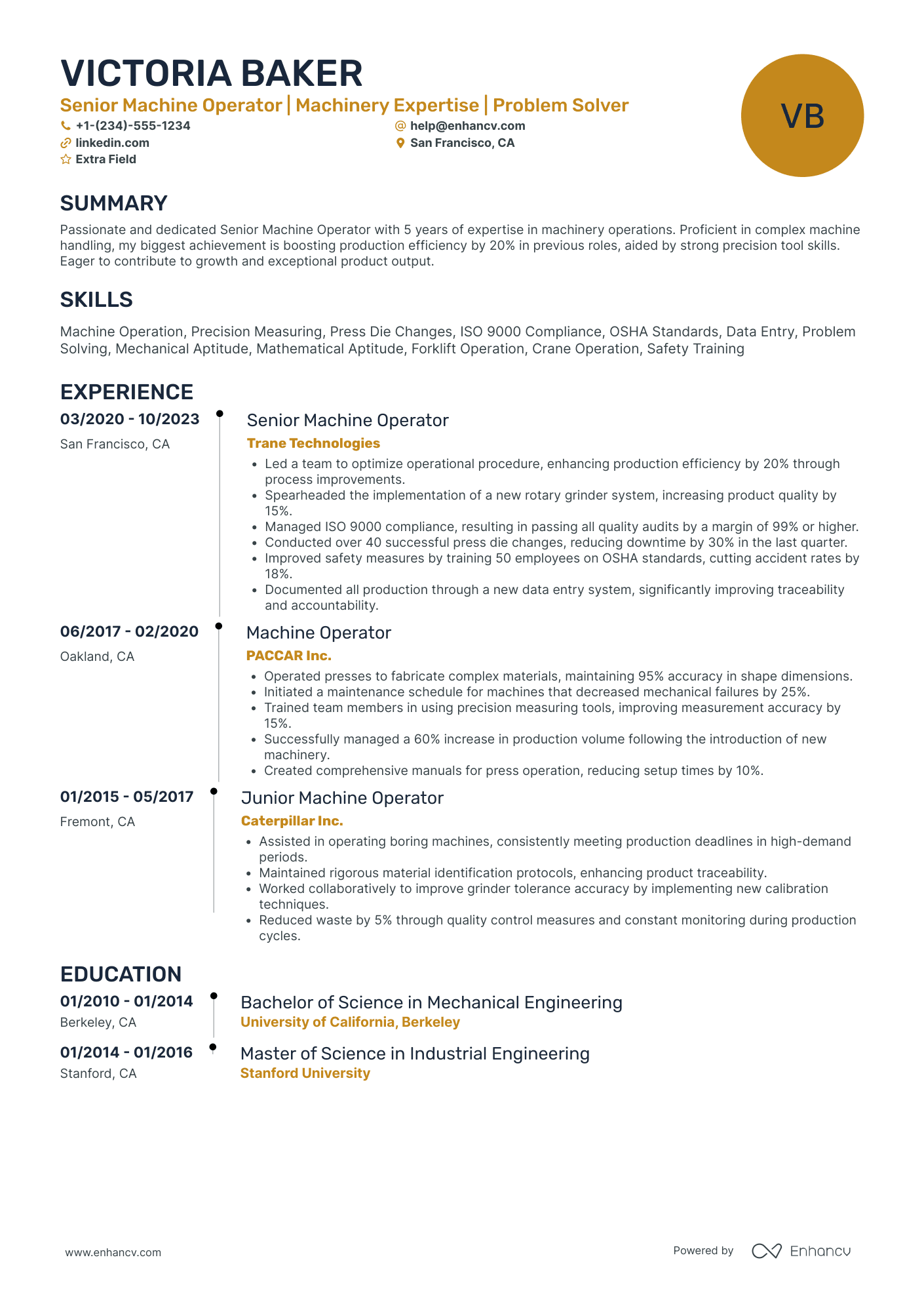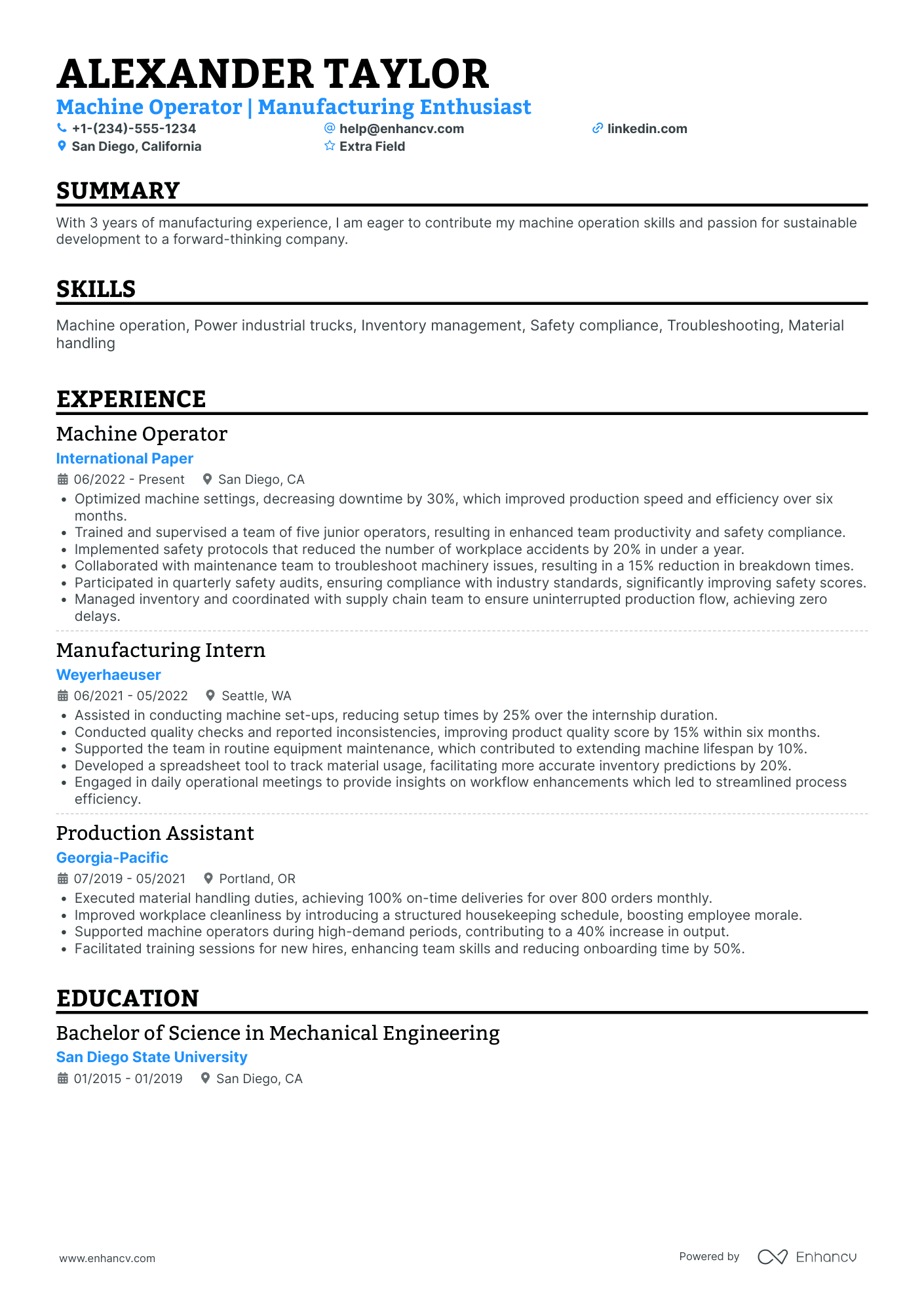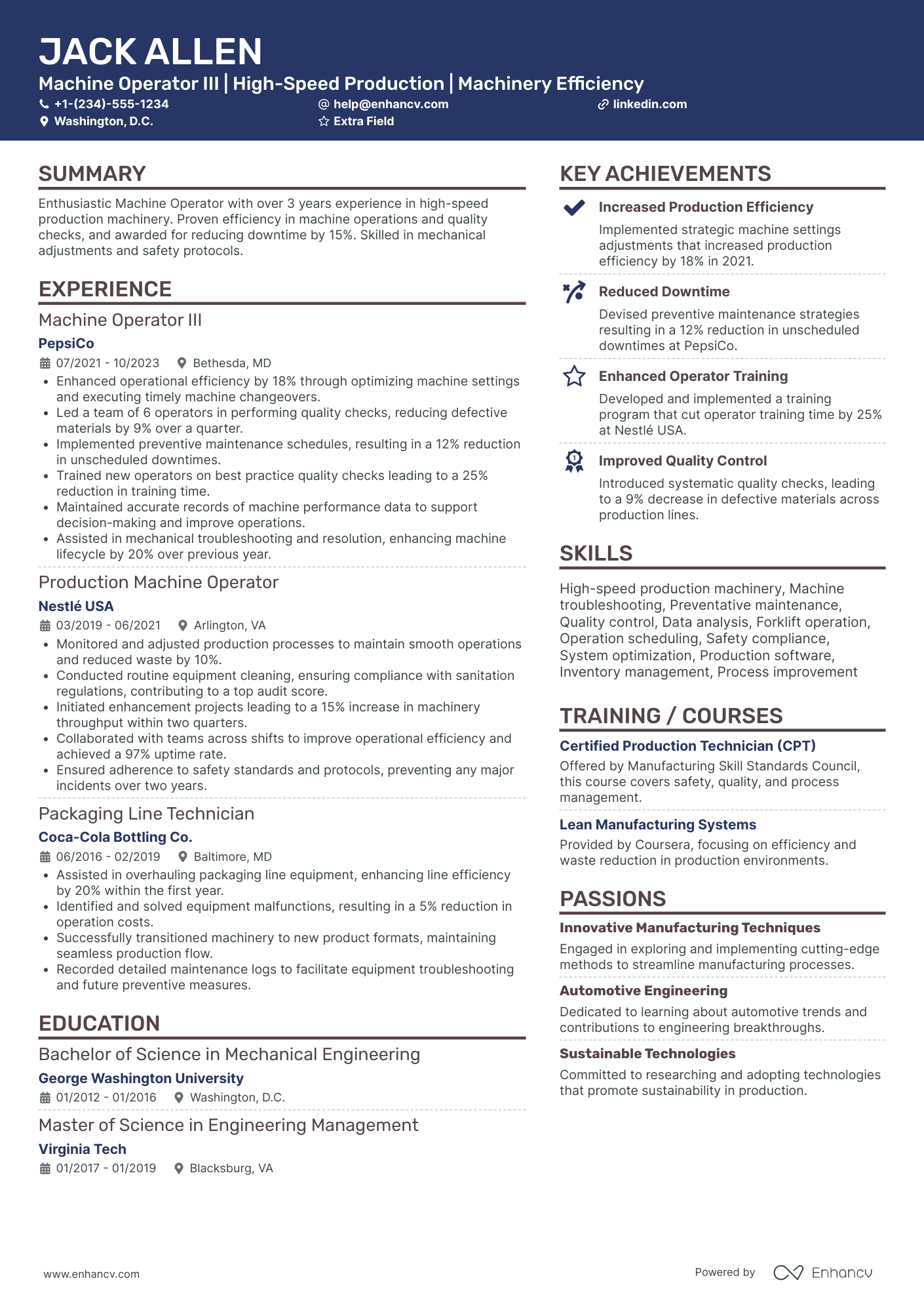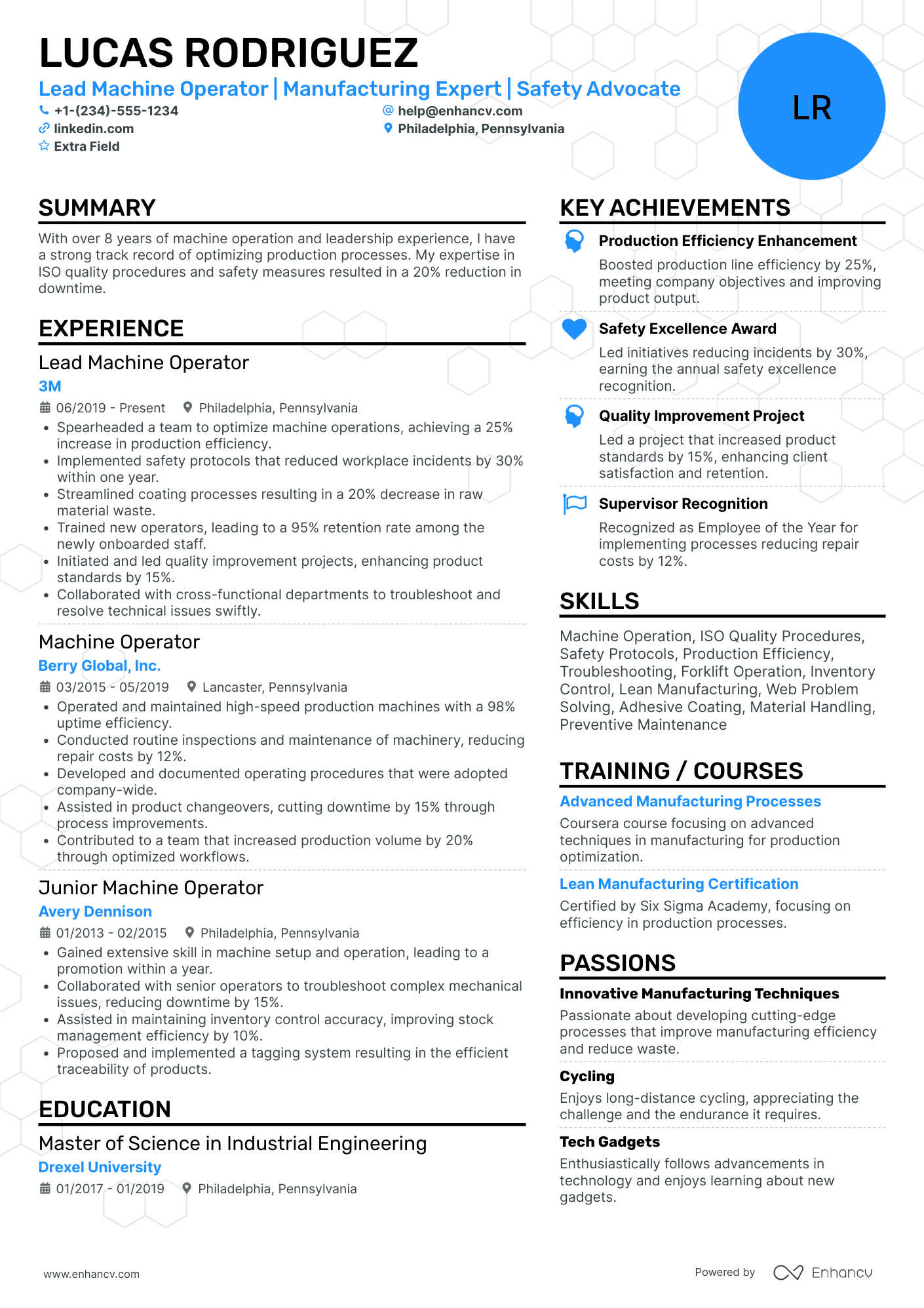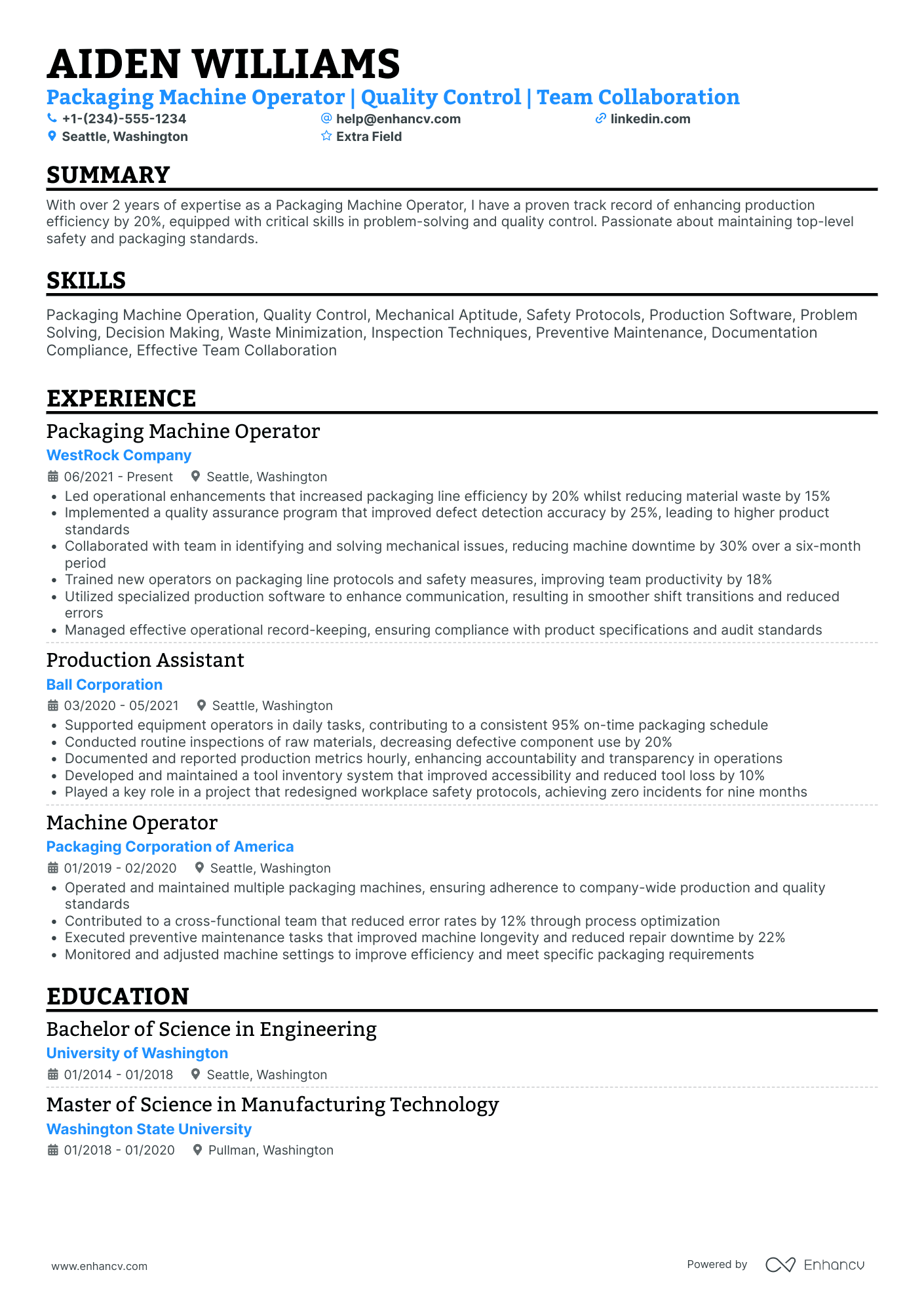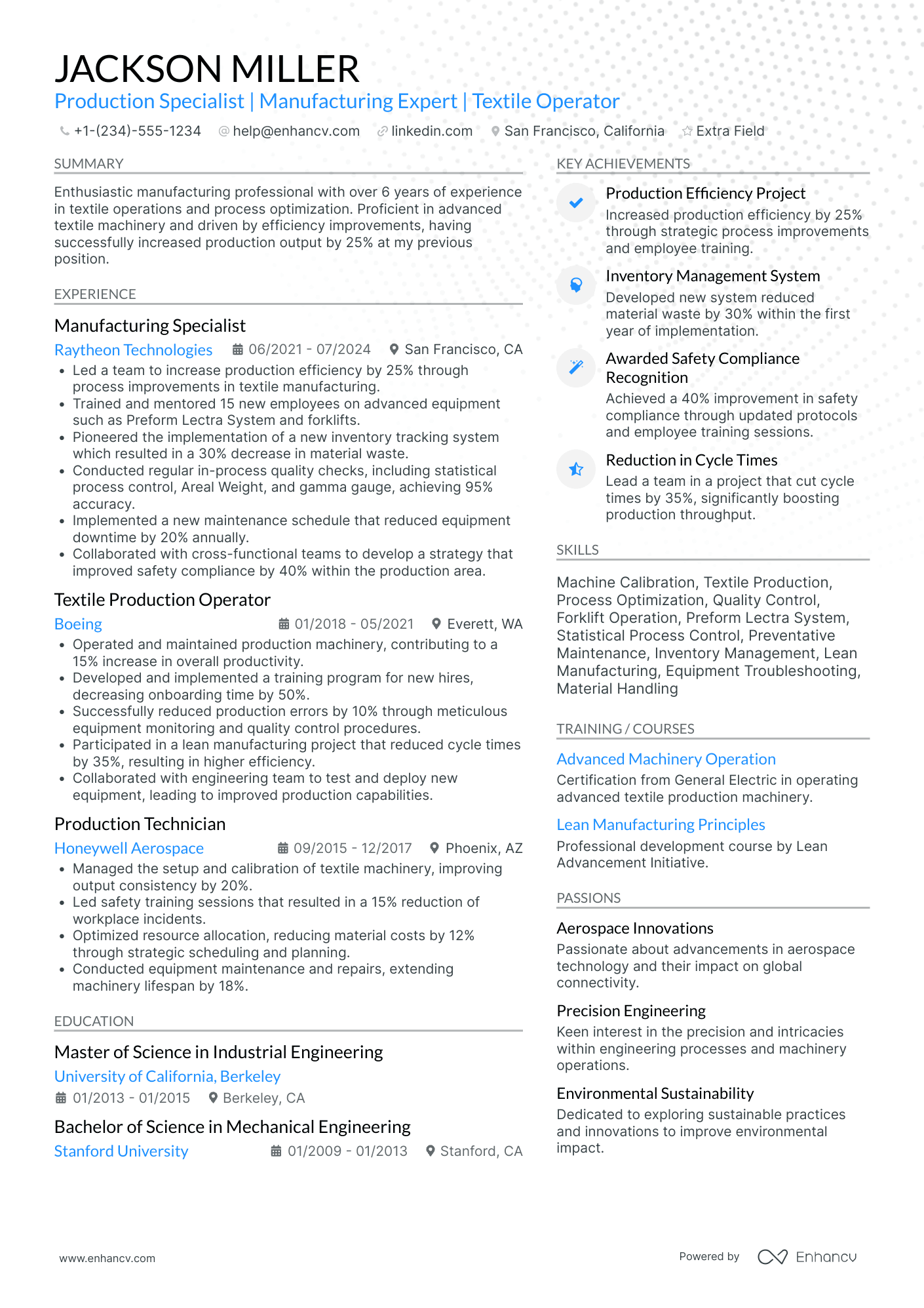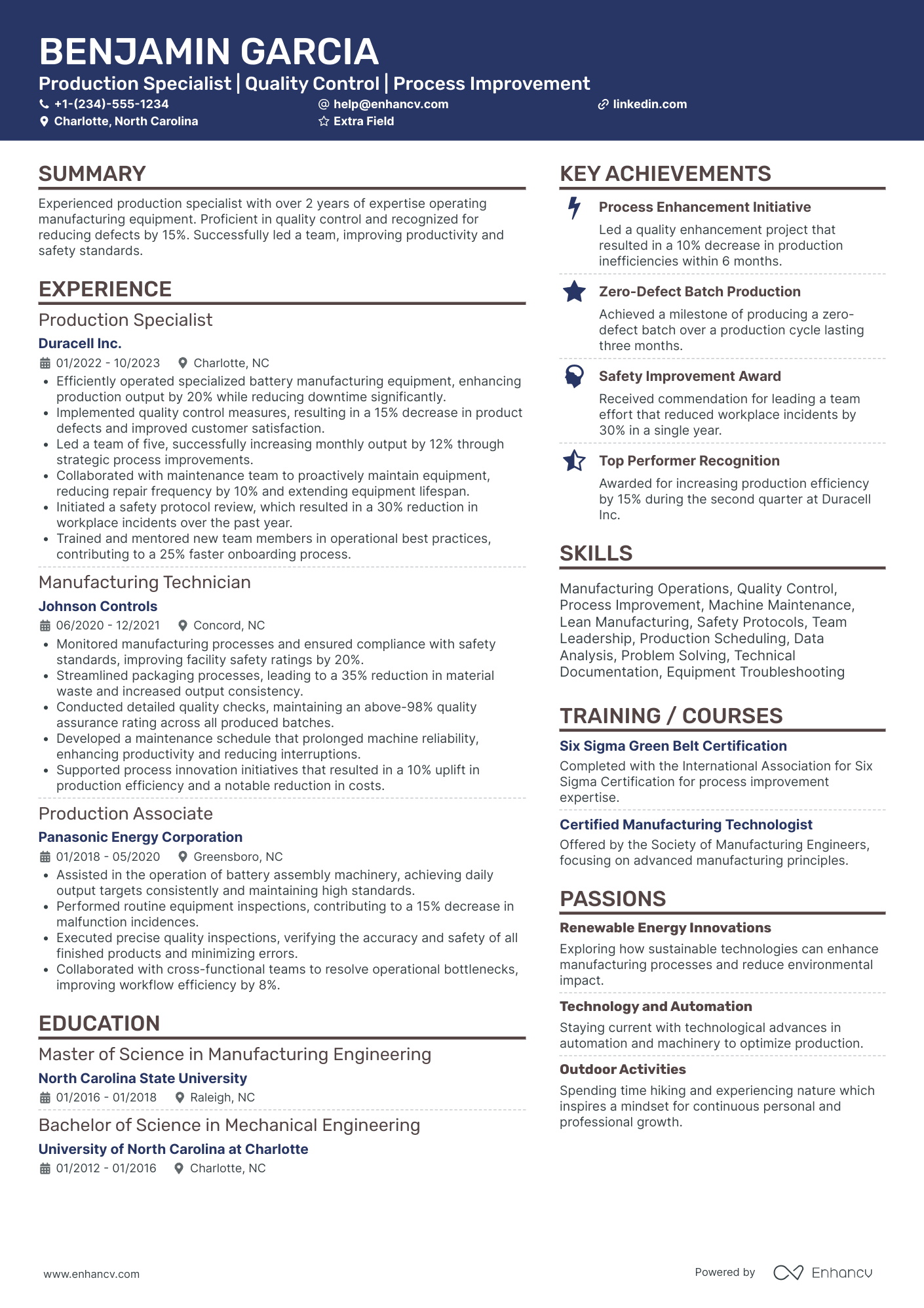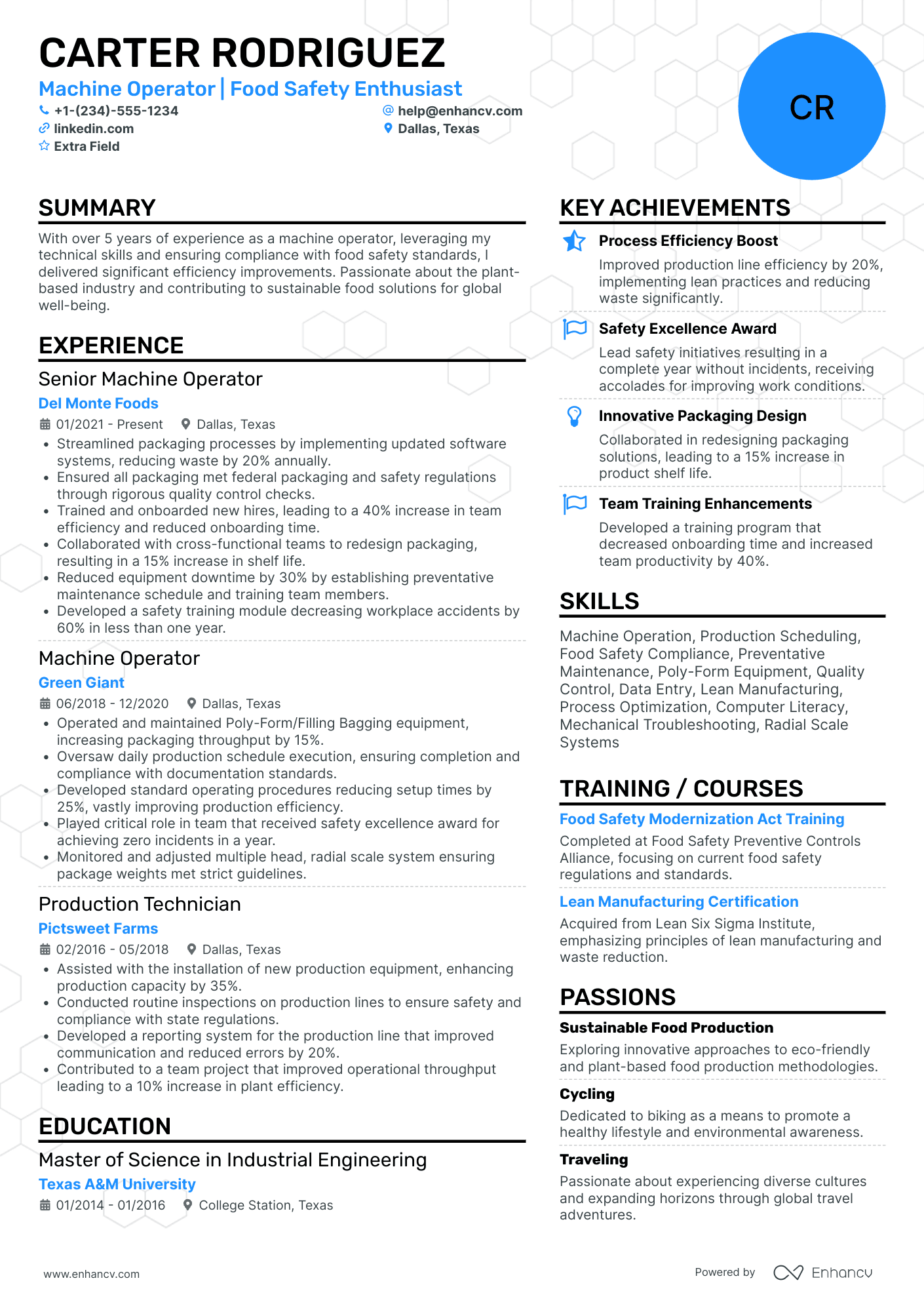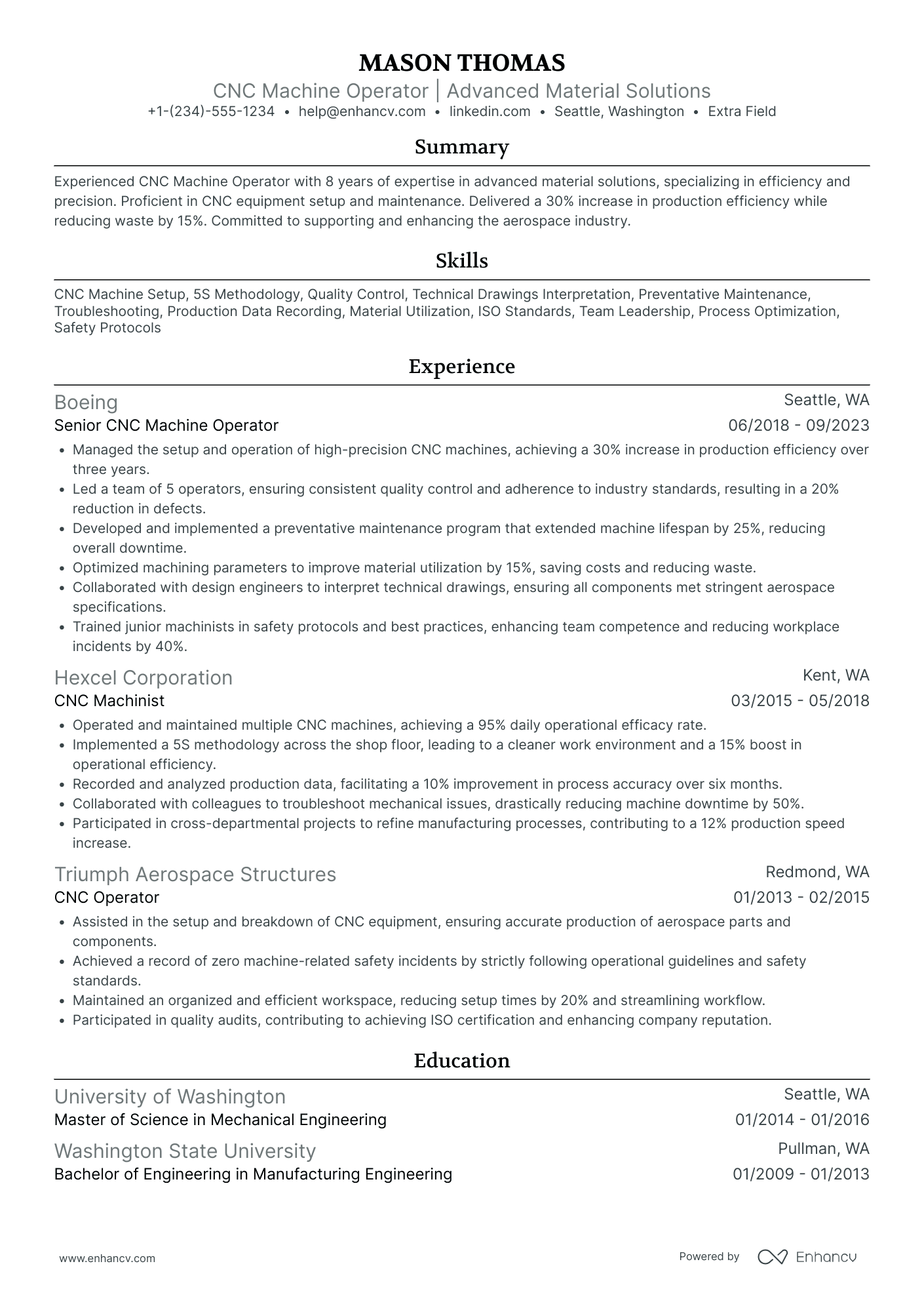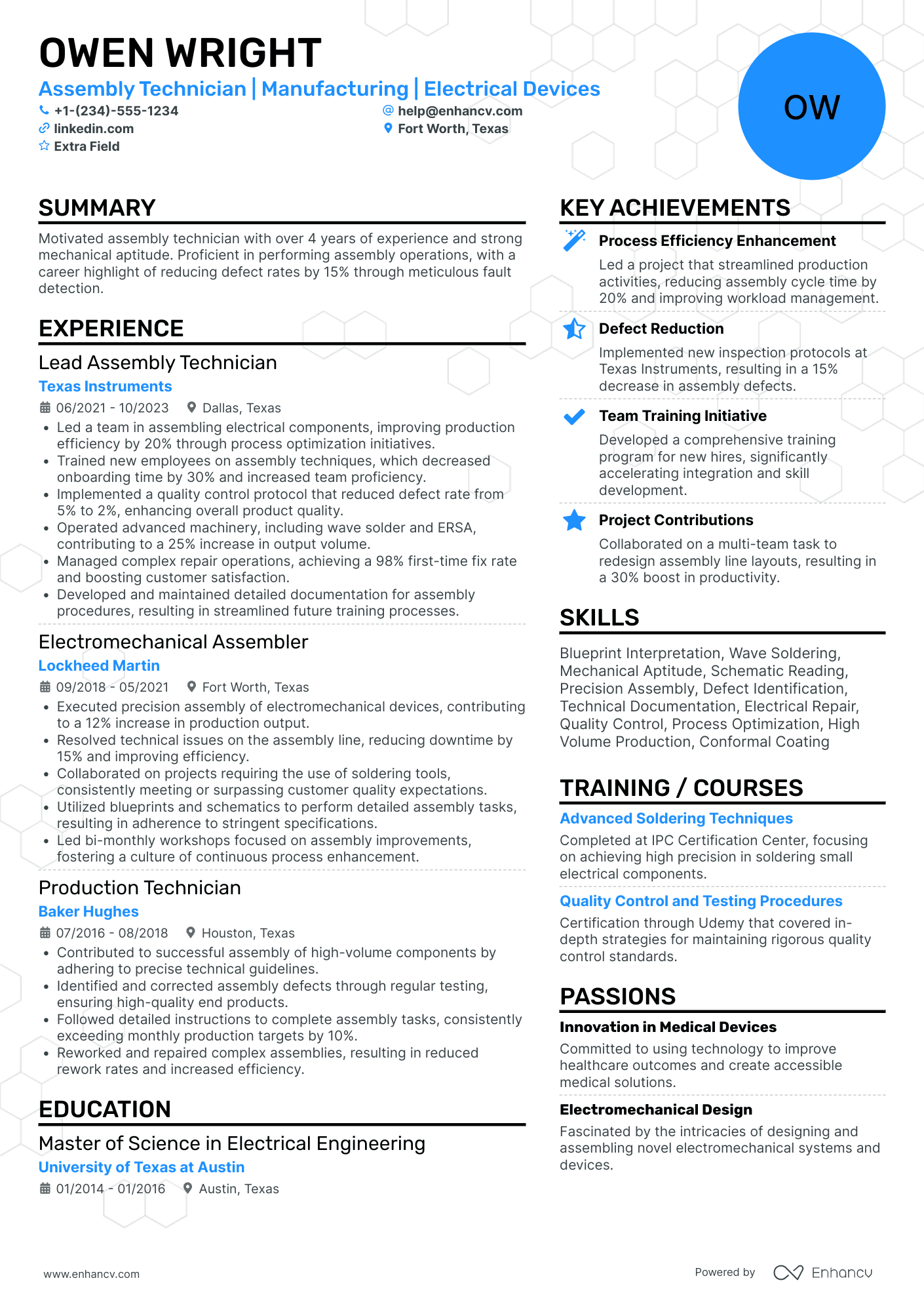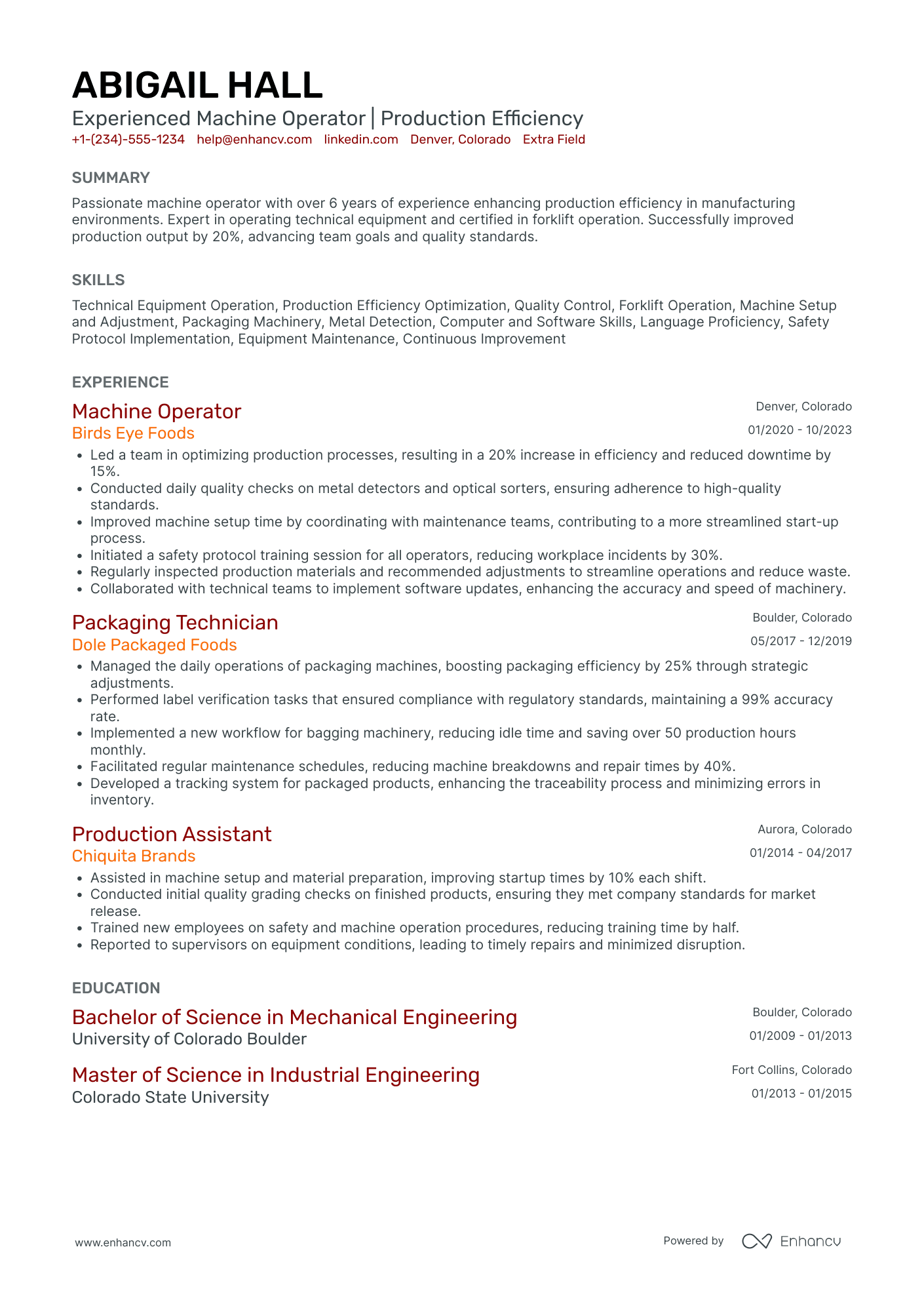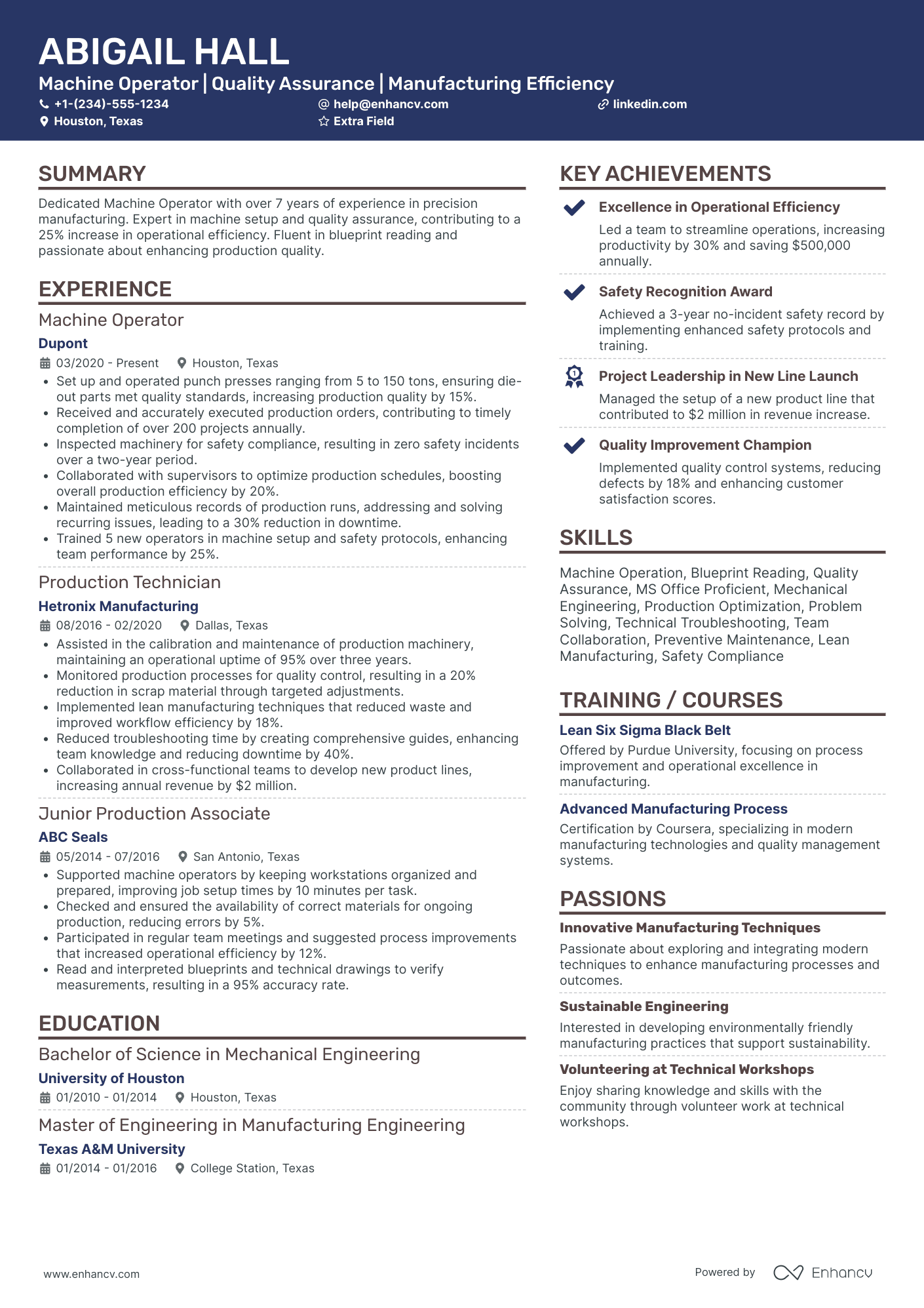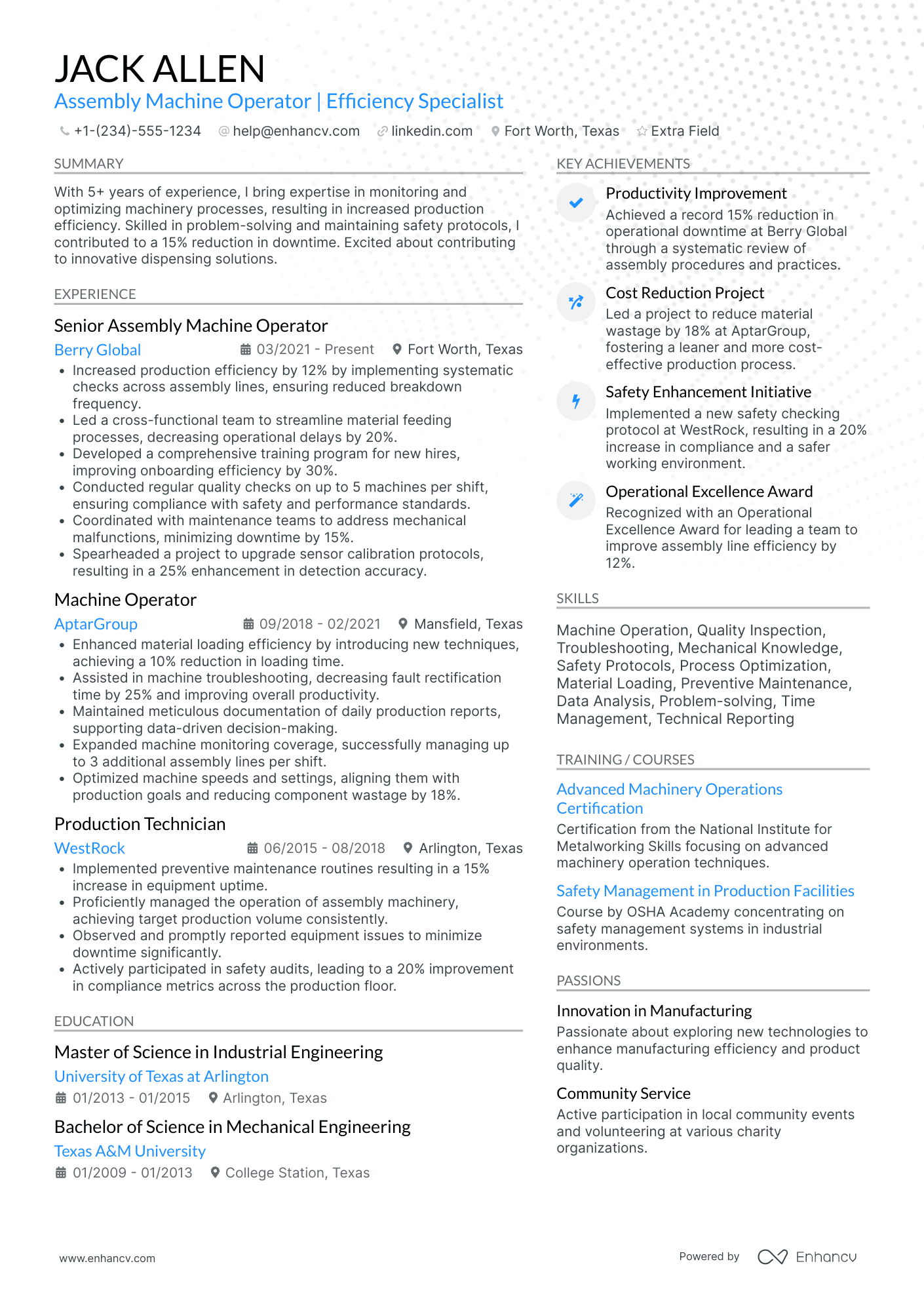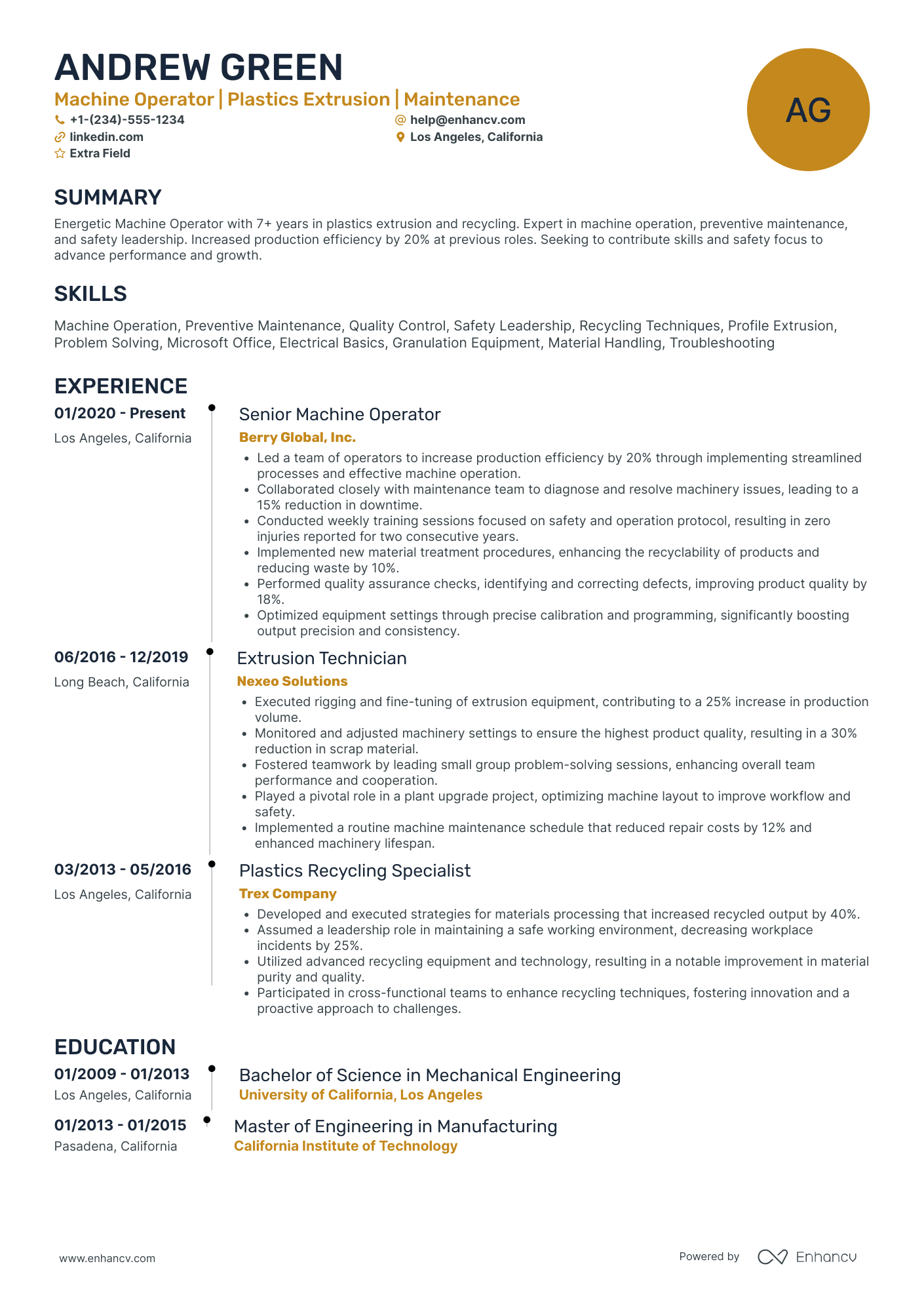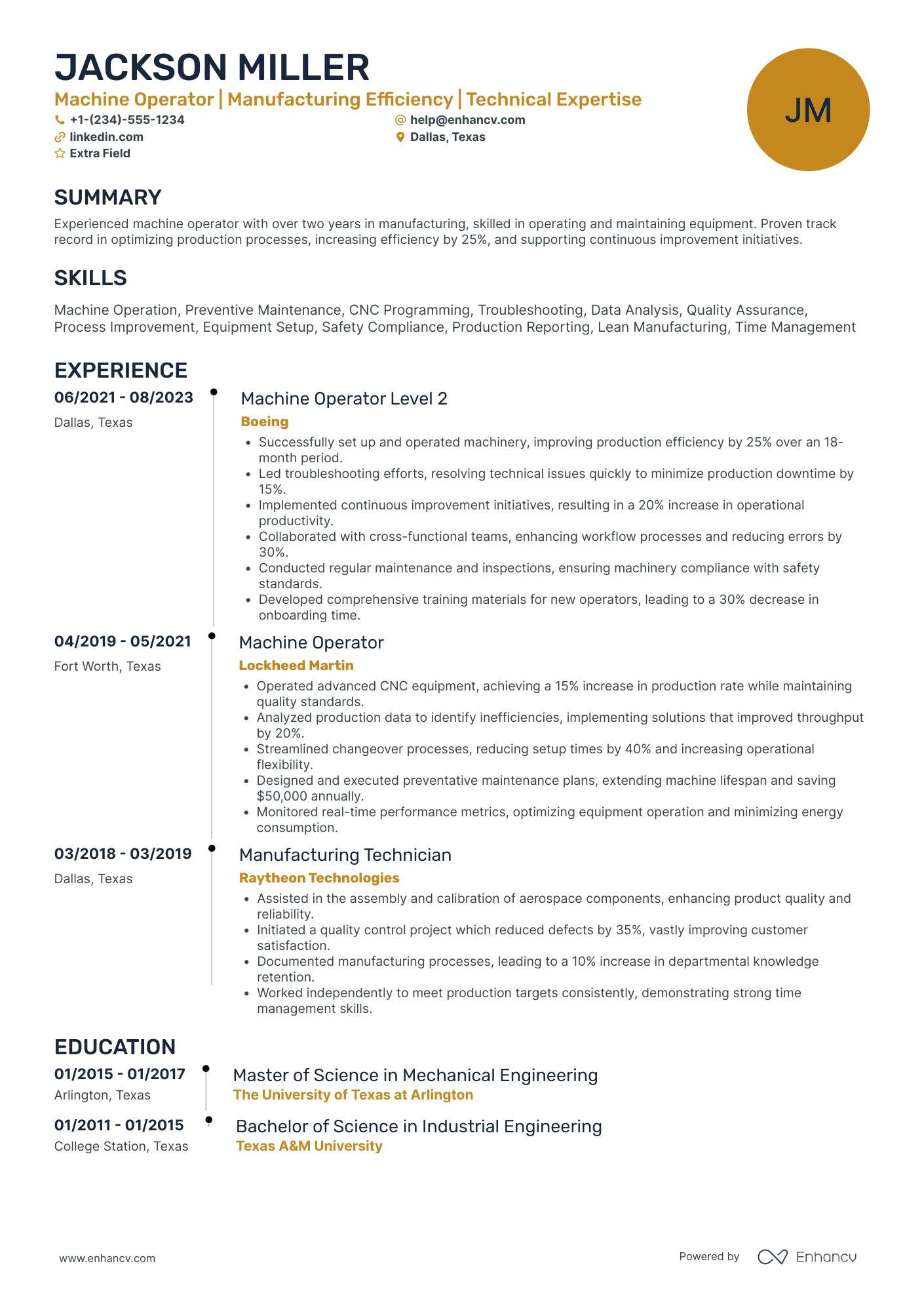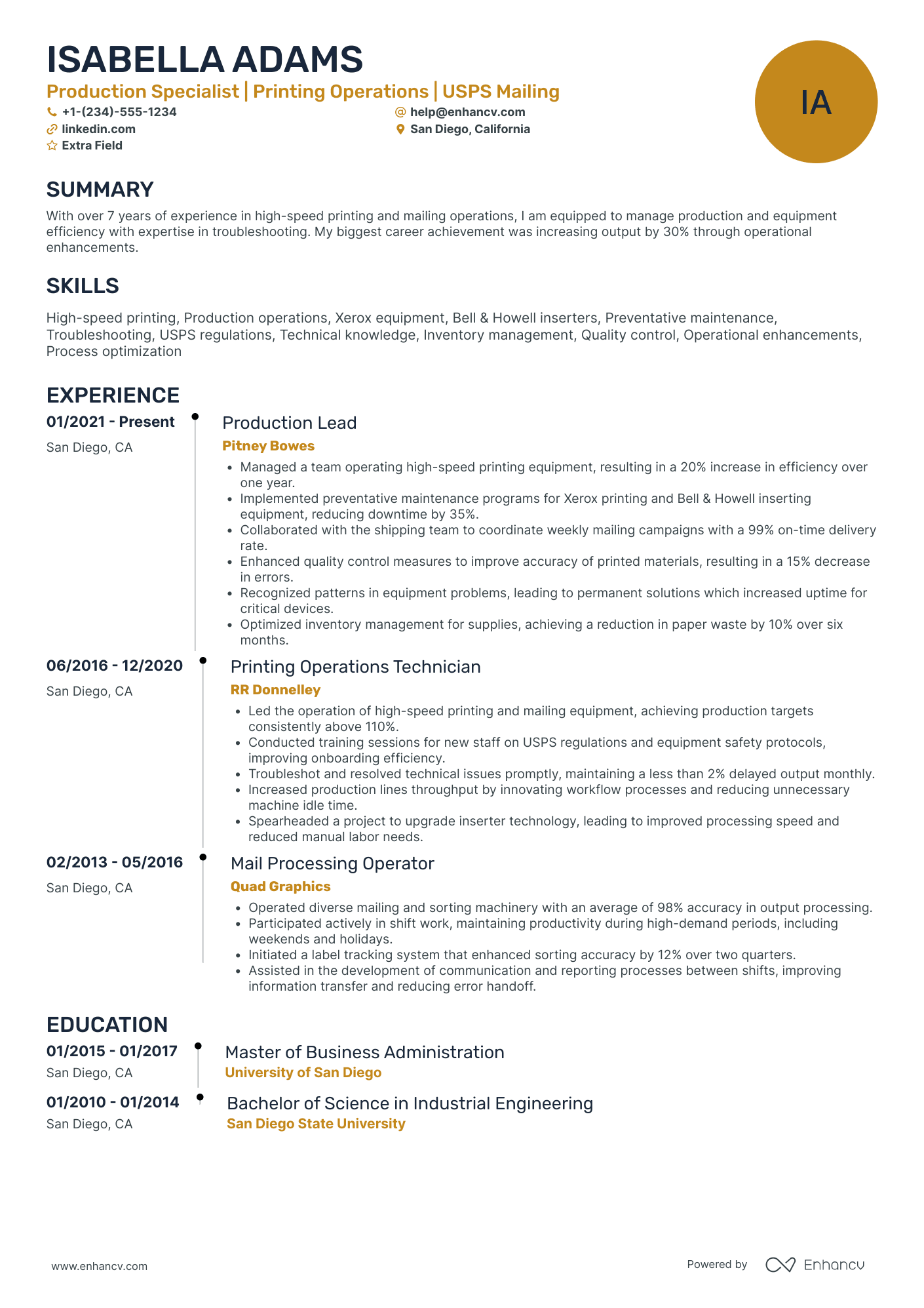As a machine operator, you may find it challenging to effectively showcase your technical skills and experience on a resume due to the specialized nature of your work. Our guide can help you articulate your achievements and qualifications in a clear, professional format that will catch the eye of potential employers.
- Aligning the top one-third of your machine operator resume with the role you're applying for.
- Curating your specific machine operator experience to get the attention of recruiters.
- How to list your relevant education to impress hiring managers recruiting for the machine operator role.
Discover more machine operator professional examples to help you write a job-winning resume.
- Plant Manager Resume Example
- Inventory Control Manager Resume Example
- Machinist Resume Example
- Assistant Production Manager Resume Example
- Parts Manager Resume Example
- Carpenter Resume Example
- Inventory Manager Resume Example
- Production Manager Resume Example
- Logistics Coordinator Resume Example
- Dispatcher Resume Example
Is there a correct way to format your machine operator resume?
This is a tricky question. While skimming over your resume, recruiters will be looking at your experience and the message your profile conveys. That's why your resume format needs to be clear and concise, serving to supplement and organize your experience. Professional best practices point that the best machine operator resumes:
- Follow the reverse chronological order, where the most recent experience items are presented first . This is to keep your expertise succinct and to show recruiters your career growth over the years;
- Have a clearly defined header that includes all relevant contact information and a portfolio or a LinkedIn link. In some countries, it is acceptable to include a professional photo , so that your application is more memorable;
- Feature the most important machine operator resume sections towards the top, e.g. summary, skills, and experience. That way, recruiters can immediately find information that is relevant to the role;
- Take up no more than two pages - and two pages are the exception for more experienced professionals. Keep your expertise to the point and use your machine operator resume real estate wisely .
- Selecting modern, yet simple fonts, e.g. Rubik, Lato, etc., would help your application stand out;
- Many candidates stick with the tried-and-tested Arial or Times New Roman, but you'd want your machine operator resume to be a bit more unique;
- The ATS can read all serif and sans-serif fonts, so you should avoid fancy, formal script (or cursive) fonts.
Consider the local standards – Canadian resumes, for example, may have a different format.
Upload & Check Your Resume
Drop your resume here or choose a file. PDF & DOCX only. Max 2MB file size.
PRO TIP
If you're in the process of obtaining your certificate or degree, list the expected date you're supposed to graduate or be certified.
Don't forget to include these six sections on your machine operator resume:
- Header and summary for your contact details and to highlight your alignment with the machine operator job you're applying for
- Experience section to get into specific technologies you're apt at using and personal skills to deliver successful results
- Skills section to further highlight how your profile matches the job requirements
- Education section to provide your academic background
- Achievements to mention any career highlights that may be impressive, or that you might have missed so far in other resume sections
What recruiters want to see on your resume:
- Proven experience with specific machines or types of machinery relevant to the job
- Technical knowledge and understanding of machine operations, maintenance, and safety protocols
- Demonstrated ability to read and interpret blueprints, schematics, and work instructions
- Record of meeting or exceeding production quotas while maintaining high-quality standards
- Proficiency in the use of computer-controlled machinery (CNC), if applicable to the position
The experience section or the essence of your professional machine operator resume
Recruiters always have and always will appreciate well-written machine operator resume experience sections.
The experience section is perhaps the most crucial element of your professional presentation, as it needs to answer job requirements while showcasing your technical expertise and personality.
Create your best resume experience section yet by:
- Selecting only relevant experience items to the role you're applying for;
- Always ensure you've listed a metric to quantify your success alongside each experience item;
- Create a narrative that showcases your machine operator career succession: this goes to show the time and effort you've invested in the field to build your experience from the ground up;
- Within each experience bullet, consider a problem you've solved, the skills you've used, and the bigger impact this has made in the organization.
Take a look at how other real-life professionals have curated their experience with the machine operator samples below:
- Operated CNC milling equipment with a 99% accuracy rate, producing complex parts that consistently met predefined specifications for aerospace clients.
- Implemented a new system for tracking machine maintenance that reduced downtime by 20% and increased overall productivity.
- Led a team project to optimize machining paths for high-volume parts production, which cut production time by 15% while maintaining quality standards.
- Managed the operation of metal stamping machines, supervising a shift of 10 operators and achieving a 10% increase in output while maintaining a safety incident-free record.
- Developed technical expertise in die-setting, resulting in a 25% reduction in setup time for new production runs.
- Collaborated with the quality control team to refine inspection procedures which helped reduce scrap rates by over 30%.
- Operated and maintained high-speed textile machinery, ensuring continuous production and reduced material waste from 5% to 3%.
- Trained new machine operators, enhancing team performance and equipment handling knowledge which led to a decrease in operator-related errors.
- Took initiative in a project to retrofit older equipment with updated technology, extending the machines' operational life by an average of 5 years.
- Specialized in operating plastic injection molding machines with precise temperature and materials control, leading to a 98% product conformity rate.
- Actively participated in the development of new plastic blends, contributing to the creation of a patented material that increased product lifespan by 40%.
- Conducted routine data analysis on production metrics to identify bottlenecks, which consequently streamlined the workflow and reduced labor costs by 15%.
- Proficiently operating advanced robotic manufacturing equipment, ensuring optimal performance and minimal disruption in a 24/7 manufacturing environment.
- Created detailed production reports that contributed to an inter-departmental understanding of efficiency metrics, resulting in a unified push towards a 5% increase in production goals.
- Piloted a safety initiative program that was adopted company-wide, significantly lowering the rate of on-the-job injuries by 40%.
- Maintained operations of chemical processing equipment, adhering to strict safety and environmental regulations and achieving a 100% audit compliance rate.
- Played a critical role in the scale-up of a new product line which contributed to a 15% increase in company revenue over two years.
- Designed and implemented a waste reduction program that saved the company $50,000 annually in disposal costs.
- Efficiently operated and troubleshooted digital printing machinery, consistently meeting tight deadlines and achieving a 95% on-time completion rate for all projects.
- Enhanced digital image quality by fine-tuning machine parameters, which resulted in an increased customer satisfaction score by 20%.
- Served as a machine operation trainer for new hires, improving the learning curve and productivity of the new team members by 30%.
- Monitored and controlled multiple wood-cutting machines within a furniture manufacturing facility, ensuring adherence to design specifications and a defect rate of less than 2%.
- Provided critical input into the redesign of workflow which led to a 25% improvement in machine utilization and material flow.
- Coordinated with the maintenance team to overhaul and upgrade machinery, resulting in a 35% reduction in unexpected machine stoppages.
The following content includes information from "O*NET OnLine" by the U.S. Department of Labor, Employment and Training Administration (USDOL/ETA). Used under the CC BY 4.0 license. The data represents the top responsibilities present on the task lists for machine operator professionals.
Top Responsibilities for Machine Operator:
- Test selected products at specified stages in the production process for performance characteristics or adherence to specifications.
- Compile and evaluate statistical data to determine and maintain quality and reliability of products.
- Study time, motion, methods, or speed involved in maintenance, production, or other operations to establish standard production rate or improve efficiency.
- Read worker logs, product processing sheets, or specification sheets to verify that records adhere to quality assurance specifications.
- Verify that equipment is being operated and maintained according to quality assurance standards by observing worker performance.
- Aid in planning work assignments in accordance with worker performance, machine capacity, production schedules, or anticipated delays.
- Evaluate industrial operations for compliance with permits or regulations related to the generation, storage, treatment, transportation, or disposal of hazardous materials or waste.
- Adhere to all applicable regulations, policies, and procedures for health, safety, and environmental compliance.
- Analyze, estimate, or report production costs.
- Assist engineers in developing, building, or testing prototypes or new products, processes, or procedures.
Quantifying impact on your resume
- Specify the number of machines you are proficient in operating, to highlight your versatility and technical skillset.
- Quantify the production targets you consistently meet or exceed, which demonstrates your efficiency and reliability.
- Mention the average downtime you've reduced through effective machine maintenance, to show your proactive approach in minimizing disruptions.
- Include the percentage increase in production you facilitated by suggesting process improvements, to exhibit your innovative thinking and impact on productivity.
- Detail the volume of materials you handle on a daily or weekly basis, indicating your capability to manage large-scale operations.
- Report on the number of safety incidents you've reduced or eliminated through vigilant operation, proving your commitment to workplace safety.
- List any training sessions or workshops you've led, with the number of participants, to present your leadership skills and knowledge transfer abilities.
- Share the exact figure of cost savings achieved through optimized machine operation or energy conservation measures you've implemented, showing your contribution to the company's financial health.
Action verbs for your machine operator resume
What to do if you don't have any experience
It's quite often that candidates without relevant work experience apply for a more entry-level role - and they end up getting hired.
Candidate resumes without experience have these four elements in common:
- Instead of listing their experience in reverse-chronological format (starting with the latest), they've selected a functional-skill-based format. In that way, machine operator resumes become more focused on strengths and skills
- Transferrable skills - or ones obtained thanks to work and life experience - have become the core of the resume
- Within the objective, you'd find career achievements, the reason behind the application, and the unique value the candidate brings about to the specific role
- Candidate skills are selected to cover basic requirements, but also show any niche expertise.
Recommended reads:
PRO TIP
If you happen to have some basic certificates, don't invest too much of your machine operator resume real estate in them. Instead, list them within the skills section or as part of your relevant experience. This way you'd ensure you meet all job requirements while dedicating your certificates to only the most in-demand certification across the industry.
Balancing hard and soft skills in your machine operator resume
Recruiters indeed pay close attention to the specific hard and soft skills candidates possess. Hard skills refer to technical abilities or your proficiency in technologies, while soft skills are the personal attributes and qualities developed over your lifetime.
If you're unsure about effectively quantifying these skills on your resume, follow our step-by-step guide. It's crucial to first understand the key job requirements for the role. Doing so enables you to accurately list your:
- Hard skills in sections like skills, education, and certifications. Your technical expertise is straightforward to quantify. Most organizations find it sufficient to mention the certificates you've earned, along with your proficiency level.
- Soft skills within your experience, achievements, strengths, etc. Defining interpersonal communication traits in your resume can be challenging. Focus on showcasing the accomplishments you've achieved through these skills.
Remember, when tailoring your machine operator resume, ensure that the skills you list match exactly with those in the job requirements. For instance, if the job listing specifies "Microsoft Word," include this exact term rather than just "Word" or "MSO."
Top skills for your machine operator resume:
CNC Machine Operation
Hydraulic Systems
Mechanical Assembly
Blueprint Reading
Precision Measuring Instruments
Quality Control Procedures
Machine Maintenance
Safety Protocols
Troubleshooting Techniques
Computer Numerical Control (CNC) Programming
Attention to Detail
Time Management
Communication Skills
Problem-Solving
Teamwork
Adaptability
Critical Thinking
Work Ethic
Stress Management
Interpersonal Skills
Next, you will find information on the top technologies for machine operator professonals from "O*NET OnLine" by the U.S. Department of Labor, Employment and Training Administration (USDOL/ETA). Used under the CC BY 4.0 license.
Top technologies for Machine Operator’s resume:
- Bentley MicroStation
- Dassault Systemes SolidWorks
- Eko
- Supervisory control and data acquisition SCADA software
- VIA Information Tools MAN-IT
PRO TIP
List your educational qualifications and certifications in reverse chronological order.
Showcase academic background with education and certifications' sections
Listing your education and certifications should be a rudimentary part of your resume writing.
Including your relevant academic background - in the form of your higher education degree and niche-specific certificates - will prove knowledge of the industry.
For your education section:
- Start by including your degree, followed by start and graduation dates, as well as the institution;
- You could include relevant coursework, major/minor , or GPA, only if your've just graduated from college or if this information would further support your application;
- If you have an "ongoing" degree, you can still list it in case you think your diploma can impress recruiters or it's required;
Follow a similar logic for your certifications section by listing the institution, alongside dates you've obtained the certificate. For some of the most recent and relevant industry certificates , check out the next part of our guide:
The top 5 certifications for your machine operator resume:
- Certified Production Technician (CPT) - Manufacturing Skill Standards Council (MSSC)
- Computer Numerical Control (CNC) Machinist Certificate - National Institute for Metalworking Skills (NIMS)
- Forklift Operator Certification - Occupational Safety and Health Administration (OSHA)
- Machine operator Professional Certification (MOPC) - Fabricators & Manufacturers Association, International (FMA)
- Certified Manufacturing Associate (CMfgA) - Society of Manufacturing Engineers (SME)
The content below includes information from "O*NET OnLine" by the U.S. Department of Labor, Employment and Training Administration (USDOL/ETA). Used under the CC BY 4.0 license. The data represents the top associations for machine operator professionals.
Top US associations for a Machine Operator professional
- Accreditation Board for Engineering and Technology
- American Society for Engineering Education
- American Society of Mechanical Engineers
- Institute for Supply Management
- Institute of Industrial and Systems Engineers
PRO TIP
Listing your relevant degrees or certificates on your machine operator resume is a win-win situation. Not only does it hint at your technical capabilities in the industry, but an array of soft skills, like perseverance, adaptability, and motivation.
Recommended reads:
The summary or objective: focusing on the top one-third of your resume
It's a well-known fact that the top one-third of your machine operator resume is the make-it-or-break-it moment of your application. The resume summary and objective could help you further build up your professional profile.
- If you have plenty of career highlights behind your back, use the resume summary . The machine operator summary immediately focuses recruiters' attention on what matters most within your experience.
- The resume objective is the perfect choice for balancing your career achievements with your vision. Use it to state precisely how you see yourself in a couple of years' time - as part of the company you're applying for.
Both the resume summary and resume objective can be your value pitch to potential employers: answering what makes your application unique and the top choice for the machine operator role. They both have to be specific and tailored - as there's no one-size-fits-all approach to writing your machine operator summary or objective. Use the machine operator examples below as a starting point:
Resume summaries for a machine operator job
- With over six years of dedicated experience in high-paced textile manufacturing, I bring a proven track record of optimizing machine workflow, reducing downtime by 30% through predictive maintenance, and implementing quality control measures that spiked production efficiency by 15%.
- Dynamic career shift: Formerly an IT specialist for five years, I am eager to transfer my problem-solving expertise and precision-driven approach to machine operation. Accustomed to fast learning curves, I am ready to apply my technical acumen in ensuring seamless production processes.
- Seeking to leverage a decade of experience as a skilled machinist in the automotive industry to deliver exceptional results in precision metal fabrication. Awarded employee of the year for significantly improving production yield by 25% through meticulous machine setup and operation.
- Transitioning from a successful seven-year journey in the aerospace engineering sector, where I mastered cutting-edge technology and systems analysis, I am now poised to apply my mechanical aptitude and strong work ethic to excel in machine operation and contribute to high-quality production outcomes.
- As a new entrant to the manufacturing realm, my objective is to swiftly absorb technical know-how and operational protocols, ensuring machines run at peak performance, to become an invaluable asset in boosting efficiency and output standards.
- Embarking on the machine operation journey, my goal is to utilize my keen attention to detail and commitment to excellence. Eager to learn from seasoned professionals, I anticipate my fresh perspective and relentless dedication will fuel innovation and productivity on the production floor.
Optimize your resume summary and objective for ATS
Drop your resume here or choose a file.
PDF & DOCX only. Max 2MB file size.
Average salary info by state in the US for machine operator professionals
Local salary info for Machine Operator.” Source: My Next Move, National Center for O*NET Development. Accessed 10/15/2024
| State | Average Salary (in USD) |
|---|---|
| US National Average | $62,610 |
| California (CA) | $73,420 |
| Texas (TX) | $60,030 |
| Florida (FL) | $61,600 |
| New York (NY) | $64,170 |
| Pennsylvania (PA) | $55,510 |
| Illinois (IL) | $68,560 |
| Ohio (OH) | $59,870 |
| Georgia (GA) | $61,060 |
| North Carolina (NC) | $62,050 |
| Michigan (MI) | $58,990 |
Miscellaneous machine operator resume sections for a more personalized approach
Your machine operator resume can reflect even more upon your personality and best qualities - that is if you decide on including a couple of additional resume sections to support your application.
Some of the best-accepted industry-wide choices include the:
- Resume projects - getting into the outcomes of your most important work, so far;
- Languages on your resume - detailing your proficiency level;
- Special recognitions - dedicated to your most prominent industry awards;
- Hobbies and interests - defining how you spend your free time.
Key takeaways
- Invest in a concise machine operator professional presentation with key resume sections (e.g. header, experience, summary) and a simple layout;
- Ensure that the details you decide to include in your resume are always relevant to the job, as you have limited space;
- Back up your achievements with the hard and soft skills they've helped you build;
- Your experience could help you either pinpoint your professional growth or focus on your niche expertise in the industry;
- Curate the most sought-after certifications across the industry for credibility and to prove your involvement in the field.
Machine Operator resume examples
By Experience
By Role

